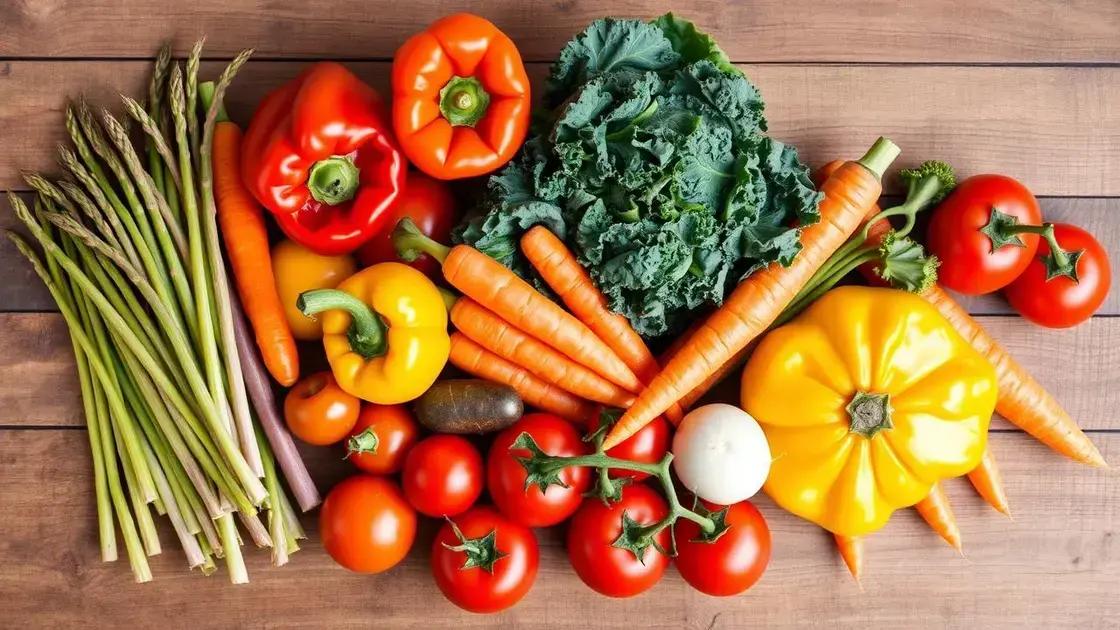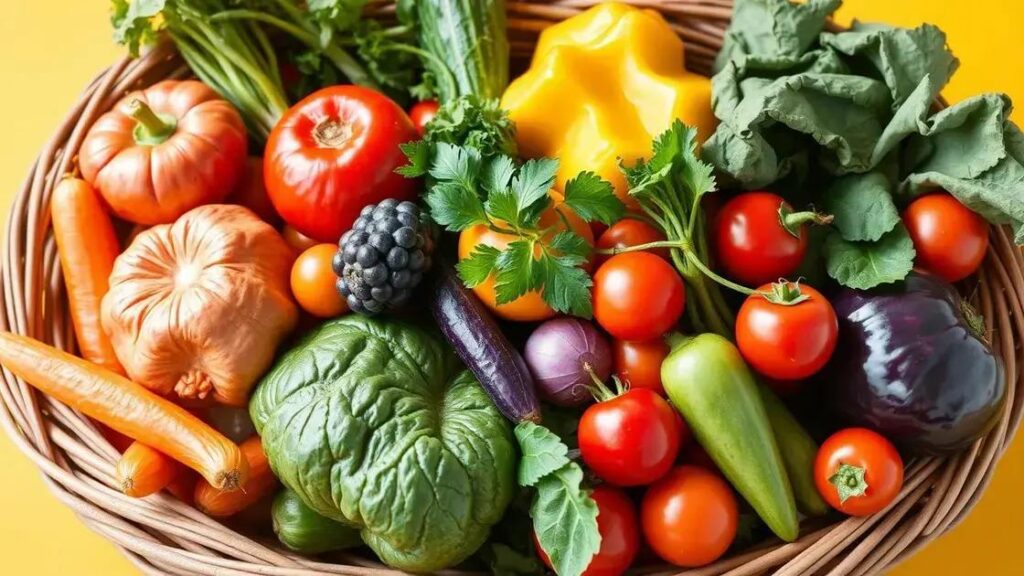Strengthening your immune system with seasonal vegetables is essential for maintaining health. Incorporating a variety of nutrient-rich seasonal vegetables into your diet, such as spinach, sweet potatoes, and bell peppers, can enhance your immune function. Simple recipes like vegetable soup, quinoa bowls, and kale salads make it easy to include these beneficial foods daily.
In a world where health is paramount, learning how to strengthen your immune system with seasonal vegetables becomes essential. These vibrant foods are packed with nutrients that boost your immunity and promote overall well-being. In this article, we’ll delve into the immune system’s functions, highlight the best seasonal vegetables to include in your diet, and provide delicious recipes that make eating healthy enjoyable.
Understanding the Immune System

The immune system is a complex network of cells, tissues, and organs that work together to defend the body against harmful invaders, such as bacteria, viruses, and parasites. Understanding how this system functions can help us take proactive steps to enhance its performance.
Components of the Immune System
Key components of the immune system include white blood cells, antibodies, and the lymphatic system. White blood cells, produced in the bone marrow, play a crucial role in identifying and attacking foreign invaders. Antibodies are proteins that specifically target these threats. Additionally, the lymphatic system helps distribute these key players throughout the body.
Types of Immunity
There are two main types of immunity: innate immunity and adaptive immunity. Innate immunity is the body’s first line of defense, responding quickly to pathogens. On the other hand, adaptive immunity develops over time and involves a stronger response tailored to specific pathogens that the body has encountered before.
Boosting Immune Function
Many factors can influence the functioning of the immune system. Nutrition plays a pivotal role in maintaining a healthy immune response. A diet rich in vitamins and minerals can support immune health. Regular physical activity, good sleep, and stress management are also essential for keeping the immune system in top shape.
Understanding how the immune system works not only emphasizes the importance of these factors but also highlights how seasonal vegetables can provide the vital nutrients needed to strengthen our defenses.
The Best Seasonal Vegetables

Including seasonal vegetables in your diet is not only delicious but also essential for strengthening your immune system. These vegetables are harvested at their peak, providing maximum nutrients. Here are some of the best seasonal vegetables for enhancing your health:
Spring Vegetables
In spring, enjoy asparagus, which is rich in vitamins A, C, and E. It also contains folate, which supports immune function. Spinach is another superfood, packed with antioxidants and vitamins that help fight infections.
Summer Vegetables
Summer brings a bounty of vegetables. Bell peppers, especially red ones, are high in vitamin C, crucial for immune support. Tomatoes are excellent for their lycopene content, which has been shown to promote health.
Fall Vegetables
As the weather cools, root vegetables like carrots and sweet potatoes come into season. These are rich in beta-carotene, which can help improve your immune system’s response. Additionally, broccoli is a fantastic choice, loaded with vitamins and minerals.
Winter Vegetables
During winter, kale and brussels sprouts shine. Kale is incredibly nutrient-dense, offering high amounts of vitamin K and vitamin C, while brussels sprouts provide potent antioxidants.
Incorporating these seasonal vegetables into your meals not only boosts your immune health but also adds vibrant flavors and textures to your diet.
How to Incorporate Vegetables into Your Diet

Incorporating seasonal vegetables into your diet can be easy and enjoyable. Here are some simple methods to make vegetables a regular part of your meals.
Start with Breakfast
Adding spinach or bell peppers to your morning omelet can boost nutrition. You can also blend leafy greens into smoothies for a refreshing start.
Snack Smart
Instead of reaching for chips, try cutting up raw vegetables like carrots and cucumbers to snack on. Pair them with hummus or yogurt dip for added flavor and health benefits.
Make Salads Exciting
Salads don’t have to be boring. Mix kale, cherry tomatoes, and avocado for a flavorful dish. You can also add roasted seasonal veggies like sweet potatoes or brussels sprouts for variety.
Try Stir-Frying
Stir-frying is a quick way to cook vegetables while preserving their nutrients. Use seasonal favorites like broccoli, zucchini, and snap peas in a stir-fry with protein like chicken or tofu.
By experimenting with these techniques, you can easily increase your vegetable intake and strengthen your immune system.
Delicious Recipes for Immune Health

Here are some delicious recipes that not only taste great but also help strengthen your immune health by incorporating seasonal vegetables.
Immune-Boosting Vegetable Soup
Start by sautéing onion, garlic, and carrots in a pot. Add chunks of sweet potatoes, broccoli, and vegetable broth. Simmer until all veggies are tender. Season with salt, pepper, and a pinch of cayenne for an extra kick.
Roasted Veggie Quinoa Bowl
Cook quinoa according to package instructions. While it cooks, roast a mix of zucchini, bell peppers, and brussels sprouts in the oven with olive oil, salt, and pepper. Once everything is ready, combine quinoa and roasted vegetables. Drizzle with tahini dressing for added flavor.
Kale Salad with Citrus Dressing
Massage kale leaves with olive oil and a pinch of salt. Add segments of oranges and grapefruit for a sweet touch. Toss in sliced almonds and a handful of dried cranberries. For the dressing, mix olive oil, lemon juice, honey, and Dijon mustard.
Spinach and Mushroom Frittata
In a skillet, cook chopped mushrooms and spinach until wilted. Beat eggs with a splash of milk, salt, and pepper, then pour over the veggies. Cook on low until set, then broil for a few minutes to brown the top.
These recipes make it easy and enjoyable to include seasonal vegetables in your meals while supporting your immune health.
Strengthening Your Immune System with Seasonal Vegetables
By incorporating a variety of seasonal vegetables into your diet, you can significantly boost your immune health. Understanding the functions of the immune system highlights how essential it is to nourish your body with quality nutrients.
From knowing which vegetables are best to incorporating them into your daily meals through creative recipes, each step you take empowers your overall wellness. Embrace the diversity of seasonal vegetables and enjoy delicious meals that promote health and vitality.
By making these small dietary changes, you can take proactive steps toward a stronger immune system and better health.
FAQ – Frequently Asked Questions about Strengthening Your Immune System with Seasonal Vegetables
Why are seasonal vegetables important for my immune health?
Seasonal vegetables are rich in vitamins and minerals that support immune function. They are fresher and can provide maximum nutrients, enhancing overall health.
How can I easily incorporate vegetables into my meals?
You can add vegetables to breakfast, use them as snacks, create exciting salads, or include them in stir-fries. Experimenting with recipes will make it enjoyable.
What are some good recipes for boosting immune health?
Delicious recipes include immune-boosting vegetable soup, roasted veggie quinoa bowl, kale salad with citrus dressing, and spinach and mushroom frittata.
Which seasonal vegetables are best for immune health?
Great seasonal vegetables include spinach, sweet potatoes, bell peppers, kale, and broccoli. Each offers unique nutrients beneficial for immune support.
How often should I eat vegetables for optimal health?
Aim to include a variety of vegetables in your diet daily. The more colorful the plate, the better it is for your immune health.
Can I freeze seasonal vegetables for later use?
Yes, freezing seasonal vegetables is a great way to save them for later. Just blanch them briefly before freezing to maintain their color and nutrients.













